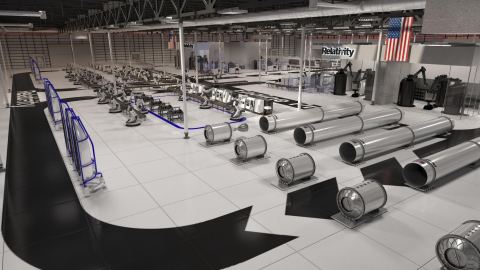Relativity to Build New Autonomous Rocket Factory and Expand Testing Facilities at NASA Stennis Space Center in Mississippi
Relativity, the world’s first autonomous rocket factory and launch services leader, today announced that it has secured an agreement with the National Aeronautics and Space Administration (NASA) and an incentive package from the Mississippi Development Authority to expand facilities and infrastructure at NASA’s historic Stennis Space Center in Hancock County, Mississippi.
This press release features multimedia. View the full release here: https://www.businesswire.com/news/home/20190611005304/en/

Rendering of Relativity's autonomous rocket factory at NASA Stennis Space Center in Mississippi (Graphic: Business Wire)
Through this agreement, Relativity will leverage valuable existing NASA infrastructure and capital investment incentives from the Mississippi Development Authority to build and integrate a pioneering robotic 3D printing rocket factory and an expanded testing facility for autonomous production of Relativity’s Terran 1 rocket launch vehicles. The agreement with NASA includes exclusive use of 220,000 square feet within building 9101 at Stennis Space Center for a 9-year lease. The facility includes an 80-foot high bay, multiple bridge cranes, and extensive industrial infrastructure. The agreement also includes an option to extend the lease for an additional 10 years. Relativity’s partnership with the Mississippi Development Authority is supported by a significant cost reimbursement and tax incentive package for Relativity's employment and capital investments for advanced aerospace manufacturing and technology development in the State of Mississippi.
Disrupting 60 years of global aerospace manufacturing, Relativity is developing the first and only aerospace platform to integrate machine learning, software, and robotics with metal 3D printing technology to build and launch rockets in days instead of years. Traditional aerospace manufacturing relies on fixed tooling, a complex supply chain, and extensive human labor. Relativity’s groundbreaking autonomous rocket platform is highly reconfigurable, with a radically simplified supply chain and no fixed tooling, reducing part count 100x.
On path to first orbital launch in 2020, Relativity will be building out first stage assembly, engine integration and testing, and a full 3D printing and robotics-enabled production line at the site. The technologies developed through Relativity’s Stennis Factory site are the first step toward the company’s long term vision of 3D printing the first rocket made in Mars and expanding the human experience in space. Through the factory build-out and expansion, the company will create a total of 200 jobs and invest $59 million in the state of Mississippi.
This partnership between Relativity, NASA and the Mississippi Development Authority advances innovation, economic development, and job growth in the Gulf Coast, and progresses Relativity’s leadership in American aerospace development. Relativity will invest in regional workforce development programs, university and education outreach, and community engagement initiatives. The infrastructure and resource incentives will enable the company to accelerate development and scaling of its technology and shorten lead times to launch.
“We are excited to partner with NASA and the Mississippi Development Authority to bring our patented 3D printing rocket platform to Hancock County,” said Jordan Noone, cofounder and CTO of Relativity. “We believe this groundbreaking technology is the future of aerospace manufacturing, and we look forward to bringing this innovation to the Gulf Coast.”
“This partnership will foster innovation, investment, and growth in Mississippi,” added Tobias Duschl, VP of Operations at Relativity. “The integration of our 3D printing rocket production and testing facilities at one site will also enable Relativity to offer greater flexibility to commercial and government entities needing faster, more frequent, and lower cost access to space.”
“This agreement demonstrates again NASA’s commitment to work with our industry partners to expand commercial access to low-Earth orbit. This helps NASA maintain focus on the ambitious Artemis program that will land the first female and the next male on the south pole of the moon by 2024. Relativity is a valuable member of the Stennis federal city and we look forward to building on our already successful partnership. This is a significant expansion of their presence at Stennis and we appreciate their confidence in making south Mississippi an integral part of their future,” said Dr. Rick Gilbrech, Director, Stennis Space Center.
“The Mississippi Gulf Coast has a strong aerospace presence, and Relativity's expansion at Stennis further positions our state as a leader in this prominent sector,” Governor Phil Bryant said. “The important work that will be done for Relativity by our skilled workforce will play a crucial role in developing new methods to connect to outer space and other planets.”
Relativity is accelerating growth of a customer manifest including leading global satellite operators, commercial companies, and government payloads. Recently, the company announced customer agreements with Telesat, the renowned global satellite operator, to support their LEO constellation; mu Space, the innovative Thai satellite and space technology company, to launch their first LEO satellite; and Spaceflight, the leading satellite rideshare and mission management provider, to launch Spaceflight’s dedicated smallsat rideshares. Relativity is on track to conduct its first orbital test launch at the end of 2020 and enter commercial service in 2021.
With this expansion at Stennis, Relativity is increasing infrastructure fourfold to over 280,000 square feet of operations, production, testing, and launch facilities and is on track to reach over 350,000 square feet of space in 2019. In the past year, the company increased team size over 6x from 14 to 90 employees. Relativity became the first venture-backed company to secure a launch site Right of Entry at Cape Canaveral Launch Complex-16 from the U.S. Air Force, and has a 20-year exclusive-use Commercial Space Launch Act (CSLA) agreement at the NASA Stennis Space Center E4 test complex, as well as membership on the National Space Council advising the U.S. White House. Relativity is also securing a polar and Sun Synchronous Orbit (SSO) capable launch site this year.
About Relativity
Relativity is the first autonomous rocket factory and launch services leader for satellite constellations. The company’s vision is to build the future of humanity in space -- starting with rockets. Disrupting 60 years of aerospace technology, Relativity’s platform vertically integrates intelligent robotics and 3D autonomous manufacturing technology to build the world’s first entirely 3D printed rocket, Terran 1. Terran 1 has 100x lower part count than traditional rockets, a radically simple supply chain, and will be built from raw material to flight in less than 60 days with unparalleled iteration speed. Relativity deploys and resupplies satellite constellations with industry-defining lead time, flexibility, and cost, better connecting and securing our planet.
Relativity is backed by leading investors including Playground Global, Y Combinator, Social Capital, Phillip Spector formerly of Intelsat, and Mark Cuban. For more information, please visit https://www.relativityspace.com/.
View source version on businesswire.com: https://www.businesswire.com/news/home/20190611005304/en/




